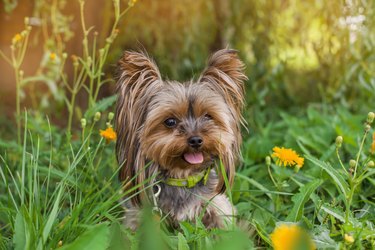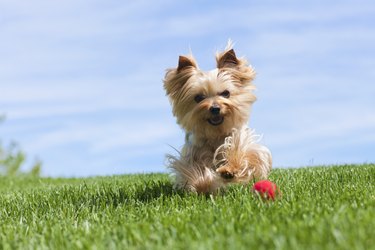The Yorkshire terrier originated in Scotland as the Waterside terrier but acquired its current name after being brought by immigrants to the area of Yorkshire, England in the mid-1800s. There the Yorkie underwent changes resulting in the standard Yorkshire terrier we see today. One of the changes is size: Most Yorkshire terriers are about seven pounds. Occasionally, one in a litter will be smaller and referred to as a "teacup."

Video of the Day
But Yorkies shouldn't be intentionally bred to be small. Although considered a toy breed, the Yorkie was originally a working dog employed as a rat-catcher in textile mills. More likely a pampered pet now, the Yorkie remains a vigorous, energetic, and generally healthy little dog.
Video of the Day
Yorkie size comparison
Officially, there are not different Yorkie breeds. The American Kennel Club weight standard for Yorkshire terriers states they cannot "exceed 7 pounds." Due to unethical breeding of undersized Yorkie "runts" — whose resulting offspring more often than not suffer serious health issues — most reputable breeders and Yorkie organizations consider breeding of dogs smaller than 4 pounds unethical. Yorkie size comparisons is the difference.
Yorkies are in the toy group, but the AKC does not recognize "teacups." No breeds such as "teacup," "micro," or "mini" Yorkshire terriers exist formally according to breeder guidelines. Teacup and similar terms are merely unofficial adjectives prefixed to the name Yorkshire terrier by unscrupulous breeders aiming at persuading prospective buyers to pay more for a tiny Yorkie.
Teacup Yorkie vs. regular Yorkie
All Yorkshire terriers are susceptible to some health issues — including eye disease and patellar luxation — though, for the most part, Yorkies are healthy, long-lived dogs whose average life span is 12 to 15 years. However, watch for periodontal disease, which is problems with teeth because they are prone to tooth decay, and Legg-Perthes disease, which is deterioration of the hip joint.

The general health and longevity of teacup Yorkies is another story. Due to their extremely small size, organs, and bones are proportionately tiny and often do not function as well as those of their full-sized counterparts. Hypoglycemia is common as are severe liver problems, bone breakage, and heart and respiratory problems. In addition, teacup-sized dogs tend to die younger. Females and their offspring often die during the birthing process itself — as a result of inadequately sized reproductive organs — so teacup Yorkies should be spay before being sold.
Care of teacup Yorkies
Remember, there are no different Yorkie breeds. If you simply must have a teacup Yorkie, be prepared to spend both time and money caring for your diminutive pup. For instance, Teacup Yorkies require the use of a harness rather than collar to avoid throat injuries; frequent and specialized meals to prevent hypoglycemia that could lead to fainting or coma; and careful handling by adults — these are not dogs for children, who might drop them. Small size means smaller organs too, so teacup Yorkies are prone to kidney issues.

Also, considering the small size, teacup Yorkies are susceptible to the elements. They need sweaters and warm bedding to keep body temperature normal when weather is below 68 F, and protection from sun in summer heat. Even though their ancestors were once tough active working dogs, teacup Yorkies need only mild exercise that will not tax their strength and regular veterinary checkups to find and treat any problems before they become serious.